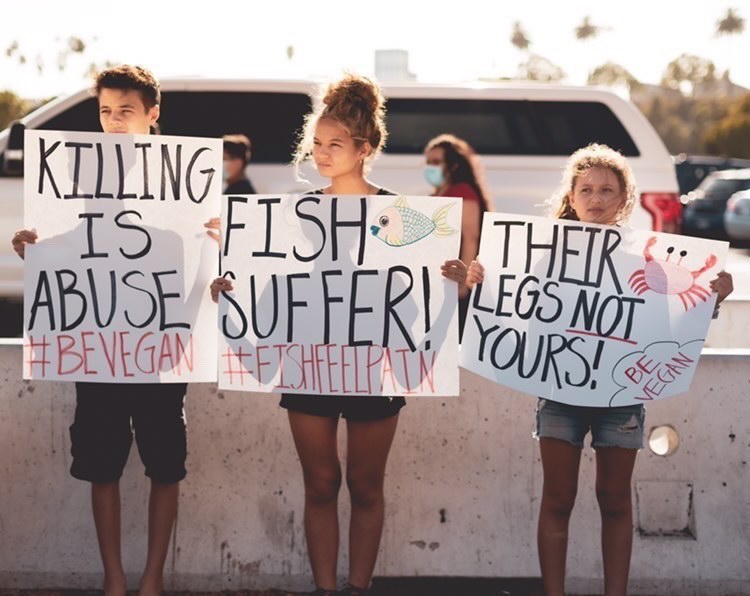Cruelty planted in animal processing industries
Working to shed light upon the realities of animal processing industries, Diamond Bar High School students Lynea and Alexander Morton-Dyke are educating others on veganism through various protests and rallies.
Though both siblings were raised vegetarians, they transitioned to veganism at the early ages of six and seven after learning about the unethical practices used in the dairy and egg industries. However, it wasn’t until 2019 that they began attending protests to further share their knowledge and beliefs.
“Our first protest was Animal Rights March,” DBHS junior Lynea Morton-Dyke said. “It felt really nice to be around like-minded people and just stand up for the animals.”
Founded in the UK, Animal Rights March is a world-wide event with over 41,000 participants from cities around the world.
In addition to this yearly event, the Morton-Dykes have also worked alongside other animal rights foundations, including People for the Ethical Treatment of Animals, March of Silence and Anonymous for the Voiceless.
“In Anonymous for the Voiceless, four people stand in a cube, it’s called the cube of truth, and each person holds a T.V. screen showing footage of different industries,” Lynea Morton-Dyke said.
Video footage is one of the main tools these teen activists use to show others the cruelty embedded in the animal processing industries. Animals in these industries are forced to live in unhygienic and inhumane conditions, which is why the footage is such a powerful tool that protestors utilize.
“You see how sad the videos are, like the truth about what happens, but some people make jokes about it,” Lynea Morton-Dyke said. “The cognitive dissonance some people express makes me feel sad.”
With the rise of organic fad diets, many buzz words such as “free-range” or “all-natural” have become increasingly common on meat packaging. However, these terms are often used with little to no regulation in the United States.
“The industries keep it hidden from the public because they don’t want to lose money,” Lynea Morton-Dyke said. “We kind of just want to show the truth to people.”
Though there are many environmental benefits to adopting a plant-based diet, the Morton-Dykes mainly advocate for better treatment of the animals involved in the meat, dairy and egg industries.
Due to the COVID-19 pandemic, many protests and events were cancelled, changing the way the Morton-Dykes continued their activism work. Lately, the activists are promoting a vegan diet on their personal Instagram accounts, @_scorpionvenom_ and @itsmelynea, by posting about the different events and protests they attend. In the future, the Morton-Dykes hope to expand their activism work both online and in-person.
“I could still see myself trying to help the animals and bring light onto their suffering,” Lynea Morton-Dyke said.
Your donation will support the student journalists of Diamond Bar High School. Your contribution will allow us to purchase equipment and cover our annual website hosting costs.



